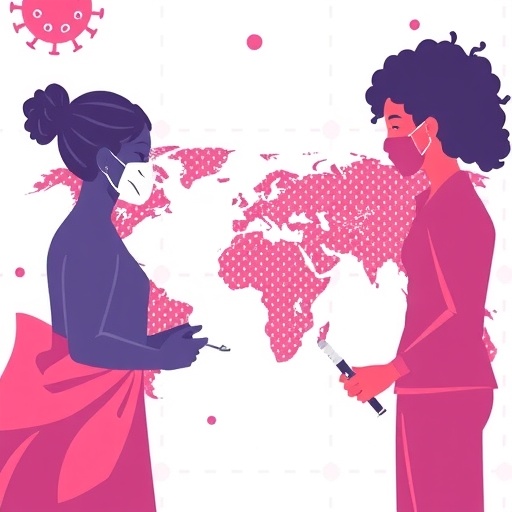In the wake of the COVID-19 pandemic, global health systems are grappling with multifaceted challenges, not least among them the revitalization of vaccination programs that had faced significant setbacks. One of the most pressing concerns is the disruption to Human Papillomavirus (HPV) vaccination efforts worldwide. Recent research highlights the intricate web of geopolitical, sociocultural, and ethical disparities that influence the uneven recovery and progress of HPV immunization, raising critical questions about equity and access in the post-pandemic era.
HPV vaccination, a cornerstone in the prevention of cervical cancer and other HPV-related diseases, was already a complex global health endeavor prior to the pandemic. The arrival of COVID-19 compounded existing barriers, exacerbating the gaps between high-income and low- to middle-income countries. Pandemic-related lockdowns, healthcare resource reallocations, and vaccine hesitancy amplified by misinformation campaigns disrupted scheduled HPV immunization campaigns, particularly affecting adolescents who form the primary target demographic.
Delving deeper, geopolitical factors play a significant role in shaping HPV vaccination outcomes beyond mere resource availability. Access to vaccines correlates with international relations, vaccine diplomacy, and the pattern of global supply chains. Countries with fragile political frameworks or those embroiled in conflict situations often face compounded challenges, including inconsistent vaccine shipments and operational disarray in health services. These disruptions underscore the necessity for a global cooperative framework that transcends political boundaries to ensure equitable vaccine distribution.
Sociocultural dynamics further complicate efforts to reinstate HPV vaccination programs. Stigma surrounding sexually transmitted infections, gender biases, and prevailing misconceptions about vaccine safety remain potent forces that hinder acceptance. Cultural sensitivities require nuanced communication strategies tailored to regional beliefs and practices, emphasizing the importance of community engagement to build trust and promote vaccine literacy. This mosaic of cultural attitudes demands that health interventions be localized and participatory to overcome resistance effectively.
Ethical considerations emerge at the intersection of these geopolitical and sociocultural contexts. The prioritization of healthcare resources during and after the pandemic sparked debates regarding the equitable allocation of vaccines. HPV vaccination, often perceived as a preventive measure for non-urgent conditions, risked deprioritization in favor of immediate COVID-19 responses. Such decisions spotlight ethical dilemmas surrounding the right to preventive healthcare and the balancing act between urgent pandemic containment and long-term disease prevention.
The pandemic’s interruptions have resulted in significant deficits in HPV vaccine coverage, threatening to reverse decades of progress in cancer prevention. Notably, children and adolescents, especially girls—the primary beneficiaries of HPV vaccination—face increased vulnerability, with potential long-term public health consequences. This calls for urgent strategic planning to identify populations most affected and to implement catch-up vaccination campaigns that address these missed doses promptly and efficiently.
Technological innovation offers promising avenues to mitigate these challenges. Advances in vaccine delivery systems, including thermostable HPV vaccines and needle-free administration methods, could enhance accessibility in hard-to-reach areas. Moreover, the integration of digital health tools facilitates real-time monitoring of vaccination coverage and enables targeted outreach, providing essential data to inform policy decisions and optimize resource allocation.
However, technology alone cannot resolve entrenched disparities. The complexity of global health inequities necessitates a multi-layered approach that integrates policy reform, community involvement, and international solidarity. Collaborative efforts through global health alliances and initiatives can facilitate knowledge exchange, resource mobilization, and coordinated responses to reestablish robust HPV vaccination frameworks worldwide.
Environmental and economic disruptions linked to the pandemic have also influenced vaccination logistics. Supply chain interruptions, increased vaccine costs, and reduced funding for preventive health programs challenge the sustainability of HPV immunization efforts. This economic strain particularly affects low-income countries, underscoring the need for sustained financial commitments from both domestic governments and international donors to uphold equitable health interventions.
Moreover, ethical governance structures must be strengthened to honor principles of justice and fairness in health delivery. This includes transparent decision-making processes and the inclusion of marginalized voices in health policy formation. Addressing structural inequities requires acknowledging and dismantling systemic barriers that disproportionately impact vulnerable populations, thereby fostering an inclusive approach to public health.
Public perception and vaccine confidence have been notably shaken during the COVID-19 crisis. The spillover effect has influenced attitudes toward other vaccinations, including HPV. Combating misinformation and rebuilding trust necessitate concerted efforts from healthcare professionals, policymakers, educators, and media platforms. Strategies that emphasize empathy, science-based information, and culturally relevant messaging are critical to overcoming skepticism and enhancing vaccine uptake.
In recognizing the compounded challenges, international organizations have advocated for integrating HPV vaccination within broader health system strengthening initiatives. Such integration ensures sustainability and resilience, enabling systems to adapt swiftly to future disruptions. The prioritization of immunization as a key public health objective aligns with global commitments to reduce cancer burden and achieve health equity.
Looking forward, research into the intersections of geopolitical influence, sociocultural norms, and ethical frameworks offers invaluable insights to guide policy. By understanding the multifactorial causes of vaccination disparities, stakeholders can devise holistic strategies that address both immediate recovery needs and long-term prevention goals. This renewed focus is pivotal to safeguarding global health advancements against future shocks.
Ultimately, the post-COVID landscape presents both challenges and opportunities for HPV vaccination programs. Harnessing lessons learned from the pandemic can catalyze transformative change, fostering a world where equitable vaccine access is not merely aspirational but realized. The path toward such equity demands unwavering commitment, innovation, and solidarity to protect future generations from preventable HPV-related diseases.
Subject of Research:
Article Title:
Article References:
Sad, S., Iftikhar, L. & Chamout, M. Revisiting HPV vaccination post-COVID: geopolitical, sociocultural, and ethical disparities in global health. Int J Equity Health 24, 308 (2025). https://doi.org/10.1186/s12939-025-02669-y
Image Credits: AI Generated
DOI: https://doi.org/10.1186/s12939-025-02669-y
Keywords:




